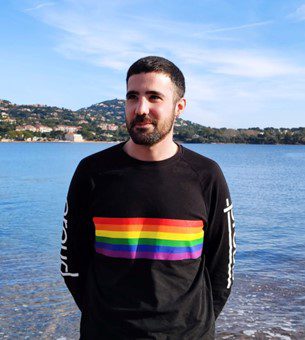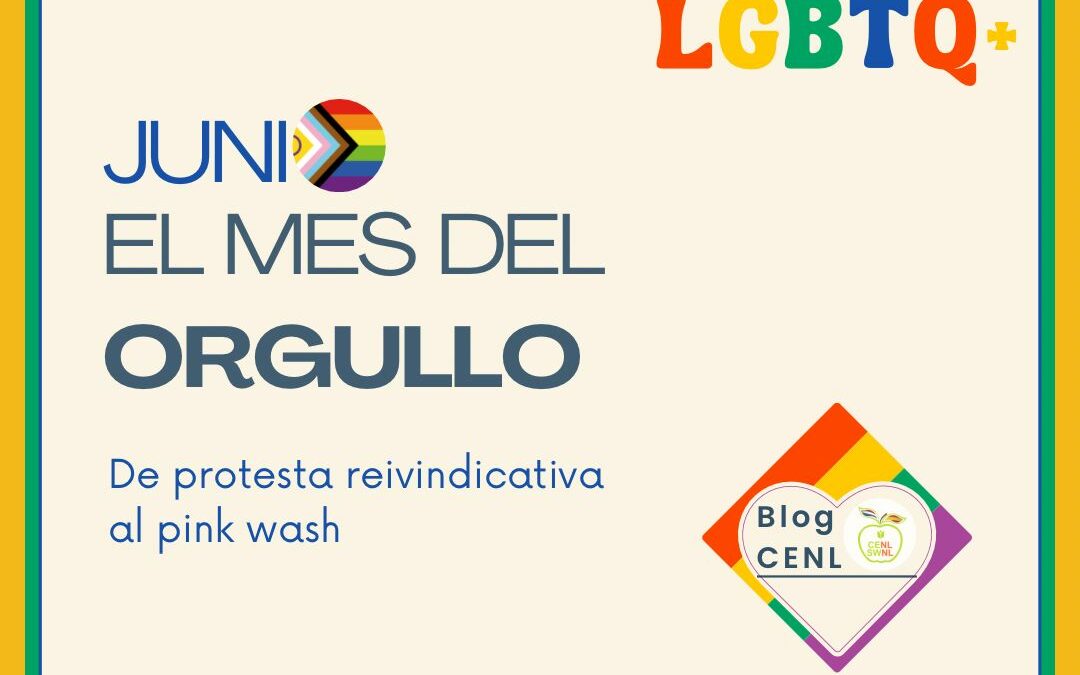-
As we could read in the previous article (https://www.cenetherlands.nl/june-pride-month-how-we-have-passed-from-a-protest-on-the-streets-to-be-used-as-pink-wash- by-institutions/) the riots that took place in Stonewall began to arouse the feelings of a community that had been severely punished and repressed. Pride day is a celebration, as well as a commemoration of the riots that took place at Stonewall in New York in 1969. In order to raise awareness that the LGTBQ+ collective is part of society, year after year, an attempt is made to promote a culture of non-aggression and claiming their rights. Fortunately, not only the LGTBQ+ community actively participates in this movement, societies as a whole support its cause. However, 54 years later, decriminalization and oppression is still present. We are not only talking about the greatest crimes that are committed such as physical assaults and murders, but we must also condemn inequalities and isolation. For example, children and young people who are or perceive themselves as LGTBQ+ are victims of homophobia, biphobia, and transphobia, as well as bullying. These practices can also occur in the workplace. In addition, the specific needs of the LGTBQ+ community are insufficiently known or ignored by the health authorities. Higher rates of mental health disorders, anxiety, depression and loneliness disproportionately affect the LGTBQ+ community, which finds it difficult to find support and empathy, finally turning to social networks in search of a support group (mainly among adolescents). the specific needs of the LGTBQ+ community are insufficiently known or ignored by the health authorities. Higher rates of mental health disorders, anxiety, depression and loneliness disproportionately affect the LGTBQ+ community, which finds it difficult to find support and empathy, finally turning to social networks in search of a support group (mainly among adolescents). the specific needs of the LGTBQ+ community are insufficiently known or ignored by the health authorities. Higher rates of mental health disorders, anxiety, depression and loneliness disproportionately affect the LGTBQ+ community, which finds it difficult to find support and empathy, finally turning to social networks in search of a support group (mainly among adolescents).
How to be a good ally
The role played by role models is undoubtedly necessary to give visibility and, in turn, support each of the people who are part of this community. But it is just as necessary to be an ally to increase social diversity and foster trust, leadership and equal opportunities. In fact, although visibility is a key point to fully integrate the LGTBQ+ collective, it is not enough without investing in the education of society. Unfortunately, social pressure is so great that many times we are governed by what has been imposed on us as ‘normal’ since our childhood. For this reason it is necessary that we continue fighting against these imposed norms. To celebrate and continue supporting the demands, we leave you with some guidelines that you can implement to be a good ally:
- Accept and promote equality
- Speak and condemn unfair situations
- Facing one’s own prejudices and unconscious prejudices
- Be aware of the use of language and labels
- Get informed and listen to the LGTBQ+ collective
- Amplify the voices of the LGTBQ+ collective
- Join and enjoy the Pride celebrations
- Put pressure on the institutions/companies where we work to implement diversity and equality policies
You can read more tips on how to be a good ally in our old blog post (https://www.cenetherlands.nl/aliados-lgbtq-101-gender-identity-and-how-to-be-a-good-ally-allied/)
The use of pride by companies and institutions: what is pinkwashing and why should it be avoided?
Pinkwashing is a term used to describe actions and campaigns (for example, marketing) carried out by public/private institutions and companies on LGBTQ+ issues to promote a corporate and/or political agenda without any return (for example, economic or social capital). towards the LGBTQ+ community (https://femmagazine.com/feminism-101-what-is-pinkwashing/). In other words, it could be said that pinkwashing is a practice carried out by “false allies” of the LGBQT+ community, who act for their own interests.
Today the presence of companies in pride is very common. Or companies whose logo is transformed into a “rainbow logo” during pride month, of which any relationship or direct help to the collective is unknown. Another example could be a clothing brand that launches an LGBTQ+-themed clothing line (for example, with LGBTQ+ flags) but whose sales profits are not reinvested in LGBTQ+ communities. Or a case closer to science, would be, for example, the display of LGBTQ+ flags at a university in which no diversity/equity/equality, anti-discrimination, or diversity committees policy is implemented. (https://dmexco.com/stories/pinkwashing-examples-that-you-need-to-know-about/).
Categorizing an institution/company or campaign as pinkwashing depends on many factors. It is important to understand that the participation of institutions and companies should not be seen as “solidarity”, but should be analyzed with critical thinking. Are the benefits (financial, image, etc.) earned in LGBTQ+ campaigns reinvested in LGBTQ+ groups? Are the values of the companies/institutions aligned with the values of diversity and equality, or is there any intention to change them? Are tangible diversity, equality and anti-discrimination policies implemented in the participating institutions/companies (and is there responsibility in the event that the policies are not complied with) and are possible discriminations in recruitment processes evaluated? They are inclusive work spaces (for example, something as simple as the presence of gender-neutral bathrooms)? Is there any lobbying to promote LGBTQ+ rights? Are the values or actions of the institutions/companies ethical, or do they violate human rights? Do multinational companies or institutions that participate in pride campaigns carry out the same campaigns / visibility of their support for the LGBTQ+ community also in countries with anti-LGBTQ+ legislation or do they silence it in those countries? All of these questions, among others, determine whether a campaign can be ‘labeled’ as pinkwashing. There are several ways and resources to avoid pinkwashing, for example for companies ( or violate human rights? Do multinational companies or institutions that participate in pride campaigns carry out the same campaigns / visibility of their support for the LGBTQ+ community also in countries with anti-LGBTQ+ legislation or do they silence it in those countries? All of these questions, among others, determine whether a campaign can be ‘labeled’ as pinkwashing. There are several ways and resources to avoid pinkwashing, for example for companies ( or violate human rights? Do multinational companies or institutions that participate in pride campaigns carry out the same campaigns / visibility of their support for the LGBTQ+ community also in countries with anti-LGBTQ+ legislation or do they silence it in those countries? All of these questions, among others, determine whether a campaign can be ‘labeled’ as pinkwashing. There are several ways and resources to avoid pinkwashing, for example for companies (https://www.retail-week.com/be-inspired/how-to-avoid-pinkwashing-to-support-lgbt-colleagues-and-customers-year-round/7041412.article?authent=1,https://vistasocial.com/insights/how-to-avoid-rainbow-washing-marketing-while-being-lgbtq-inclusive/) or scientific institutions (https://prismaciencia.org/10-medidas-prisma/).
Any campaign carried out around Pride can be analyzed in its context. For example, this year there has been a record of anti-LGBTQ+ legislation in the United States (https://edition.cnn.com/2023/04/06/politics/anti-lgbtq-plus-state-bill-rights-dg/index.html) including health, education or even performing drag shows. As a consequence, many international brands have decided this year not to change their logo to a ‘rainbow logo’ and/or not to participate in pride marketing campaigns (https://www.npr.org/2023/06/14/1182238372/corporations-scale-back-shows-of-pride-support-amid-anti-trans-and-anti-gay-laws). This would be another example of pinkwashing: when supporting LGBTQ+ causes translates into economic benefits, support or participation is given to Pride, but when its image is in danger, that support for the LGBTQ+ collective disappears.
Currently pinkwashing is a widely discussed topic. To give a local example in the Netherlands, in recent years, the Amsterdam Pride week (Amsterdam Pride week) has been criticized for its large participation of companies that practice pinkwashing and its distance from the vindictive and protest nature of the pride (https://www.parool.nl/amsterdam/forse-kritiek-op-amsterdam-pride-doek-de-canal-parade-helemaal-op~b7b2a456/,https://www.dutchnews.nl/2022/03/amsterdam-pride-is-too-commercial-and-needs-an-overhaul-report-says/). Pride can be seen as a celebration, but it should also be seen as a claim (local and international) for LGBTQ+ rights in the community as well as in its intersections with other collectives. For this reason this year, together with ‘Amsterdam Pride’, the ‘Queer pride’ will be held with a more demanding character (https://queer-amsterdam.com/english).
References
Gil-Borrelli C., Velasco C., Iniesta C., de Beltrán P., Curto J., Latasa P. Towards a public health system with pride: equity in health in the lesbian, gay, bisexual and trans community in Spain ( 2017). Social and Health Initiative for LGBT Cooperation and Equity in Spain (ISOSCELES), Spain
Berger M., Taba M., Marino J., Lim M., Cooper S., Lewis L., Albury K., Chung K., Bateson D., Skinner S.(2021) Social media’s role in support networks among LGBTQ adolescents: a qualitative study
https://www.diversitytrust.org.uk/2020/06/why-do-we-celebrate-gay-pride-month-and-why-does-it-still-matter/
https://www.bigissue.com/news/activism/how-to-be-a-good-lgbtq-ally-for-pride-month-and-beyond/
Can you help us to become more? Become a member and participate. Spread our word on the networks. Contact us and tell us about yourself and your project.

Lety (ella/elle, she/they)
Bioinformatics and Data scientist
Soy Leticia, Lety (más neutro). Soy Farmacéutica y bioinformática, hice mi doctorado en la Complutense de Madrid en 2005 en Biología molecular sobre progenitores hematopoyéticos y trasplantes de Médula ósea. He trabajado durante más de 20 años en academia siempre en cáncer desde distintas perspectivas, desarrollo de nuevos fármacos, farmacogenómica y después desde la parte Bioinformática para ayudar en el diagnóstico y estratificación de pacientes. Hace unos meses me cambié a una compañía que desarrolla tratamientos de Terapia génica.

Alberto Gil Jiménez
PhD candidate at the Netherlands Cancer Institute
My name is Alberto. I studied Physics and Chemistry at the Autonomous University of Barcelona, and Bioinformatics at the VU University Amsterdam. I am currently doing a PhD at the Netherlands Cancer Institute (Amsterdam), where I am investigating the effects of immunotherapy and chemotherapy in urological cancer. For this I use bioinformatics and computational biology tools modeling protein and DNA/RNA sequencing data, obtained from human samples, which I integrate with clinical data.

Alba M. Muniesa Vargas
PhD Candidate at Erasmus MC
Mi nombre es Alba M. Muniesa Vargas y vengo de Barcelona. Mi primer contacto en el mundo científico empezó en 2011 cuando decidí estudiar el Grado en Biotecnología en la Universidad de Vic (Barcelona). Decidí venir a Holanda en 2016 a estudiar el máster de Biomolecular Sciences en Vrije Universiteit (VU Amsterdam). Disfruté mucho de estos dos años de máster durante los que pude volver a Dinamarca, esta vez a Copenhague, para realizar mis prácticas y el trabajo final del máster. Actualmente me encuentro en la fase final de mi doctorado en el Erasmus MC, finalizando mi tesis y en búsqueda de un nuevo reto profesional. Aunque me apasiona la ciencia y la investigación, mi próximo reto será fuera del mundo académico y del laboratorio, pero manteniendo una conexión cercana con la ciencia, desde la que pueda aportar mi granito de arena. Siguiendo en esta línea, espero poder seguir participando en eventos de CENL y en particular, ¡en la nueva Comisión de Diversidad, Género e Igualdad!

